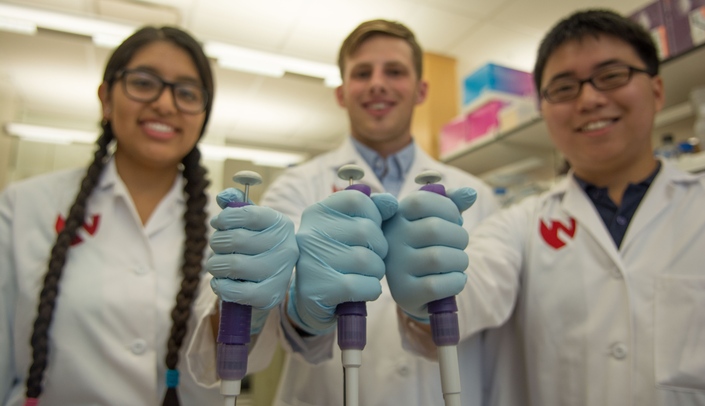FOA for the DRPP projects: Primary Undergraduate Institution (PUI) faculty are invited to submit an application for a DRPP grant proposal, for which funding would start 05/01/20. A major goal of the DRPP is to enhance the development of the research infrastructure on undergraduate campuses in Nebraska by providing support for faculty research in the form of funds for release time, instrumentation necessary for cutting-edge biomedical research, supplies, and other associated expenses. The result from the development of this research infrastructure will be to provide opportunities for NE-INBRE Scholars, as well as other undergraduate students on these campuses, to become involved in biomedical research projects supported by this program. Based on our successes thus far, we envision that DRPP support will continue to encourage high-quality, interdisciplinary biomedical research on the undergraduate campuses, enhance collaborative research and publishing amongst research investigators on all campuses within the NE-INBRE network, and continue with the development of a pipeline of students into research and research-related careers in Nebraska.
Support: Up to $45,000/yr to build research capacity by providing PUI faculty 50% release time to engage in significant research, and funding for material support of the laboratory in terms of supplies and equipment.
Timeline for solicitation of proposals: A preliminary “Letter of Intent” to submit a DRPP application will be due to the PI, Dr. Paul Sorgen, no later than 8/1/19. Complete proposals will be due no later than 10/1/19. The review process will be completed by 2/1/20. Proposals will be prioritized, and the process will allow for announcement of the recipients by 3/1/20 with commencement of funding by the NE-INBRE start date, proposed for 5/1/20.
Applicant eligibility and requirements: Faculty at the Assistant Professor level or above who hold full-time appointments at any of the participating PUIs are eligible to apply for DRPP funding. Faculty must document that they will be able to devote 0.50 FTE (six calendar months) to research and research-related activities. Cost sharing in terms of institutional salary support to meet the 0.50 FTE requirement is encouraged. Projects will be single faculty projects and evaluated annually for post-funding productivity. Successful projects will be funded for three years, with the potential for two additional years of funding pending the outcome of a three-year review of productivity. All applicants selected to receive DRPP funding are required to submit additional proposals for extramural funding such as AREA (R15) grants, NSF Career Awards, or other national research funding grant programs by completion of the third year of funding. Recipients are required to submit an Annual Progress Report for non-competitive renewal of DRPP funding. The report should document progress towards meeting the specific aims of the project, as well as productivity metrics. Additionally, successful applicants are expected to fully participate in all NE-INBRE activities, including mentoring of NE-INBRE Scholars and other undergraduate researchers; and active participation at the Annual Conference, statewide journal club, and the Regional/National IDeA Meetings. Recipients will also be expected to actively participate in campus seminars and demonstrate commitment to the development of the NE-INBRE Scholars Program.
Research proposal: Each DRPP grant proposal must contain: a) Abstract; b) Specific Aims (1 page) that concisely states what the proposed research is intended to accomplish and the overall hypothesis to be tested; c) Research strategy (6 pages) that describes the significance, background, innovation, and approach; d) Literature cited; e) Identification of extramural funding source(s) that will be targeted; f) Statement of relatedness to the scientific themes of the NE-INBRE network; g) Information about compliance with federal regulations (i.e., human/animal studies; biohazard safety); h) Detailed budget and budget justification; i) Description of the PUI environment; j) Plan for ensuring rigor and reproducibility; k) Plan for authentication of key biological and/or chemical resources; l) Identification of the RI mentor and nature of the relationship, and m) NIH-style biosketch.
Please visit the NE-INBRE web page (https://www.unmc.edu/inbre/) and download the full DRPP instructions for additional information.
